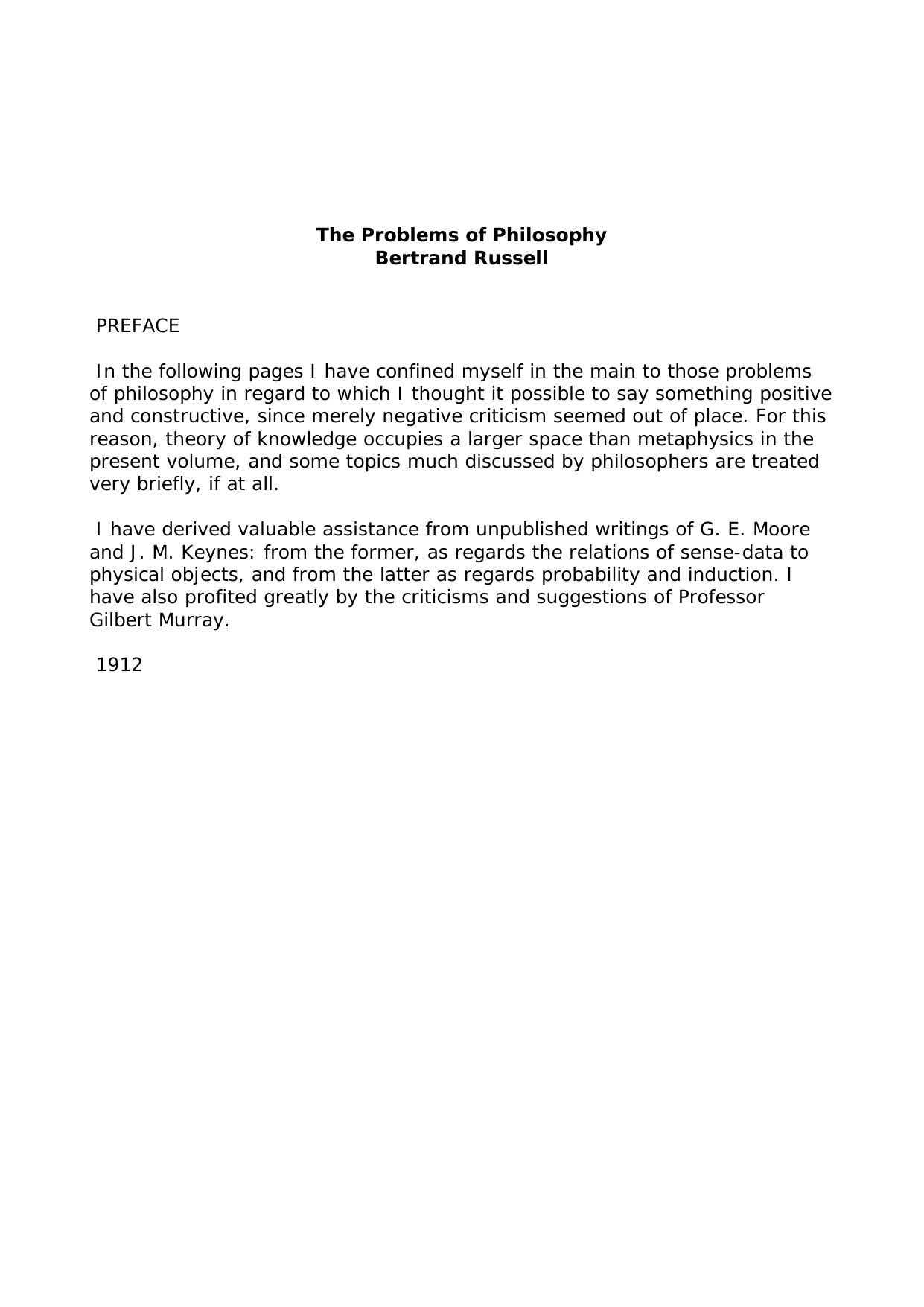The Problems of Philosophy by Bertrand Russell

Author:Bertrand Russell [Russell, Bertrand]
Language: eng
Format: epub, azw3, mobi, pdf
Tags: Knowledge, Theory of, Philosophy -- Introductions, Metaphysics
Published: 2004-06-01T03:00:00+00:00
CHAPTER IX. THE WORLD OF UNIVERSALS
At the end of the preceding chapter we saw that such entities as relations appear to have a being which is in some way different from that of physical objects, and also different from that of minds and from that of sense-data. In the present chapter we have to consider what is the nature of this kind of being, and also what objects there are that have this kind of being. We will begin with the latter question.
The problem with which we are now concerned is a very old one, since it was brought into philosophy by Plato. Plato's 'theory of ideas' is an attempt to solve this very problem, and in my opinion it is one of the most successful attempts hitherto made. The theory to be advocated in what follows is largely Plato's, with merely such modifications as time has shown to be necessary.
The way the problem arose for Plato was more or less as follows. Let us consider, say, such a notion as justice. If we ask ourselves what justice is, it is natural to proceed by considering this, that, and the other just act, with a view to discovering what they have in common. They must all, in some sense, partake of a common nature, which will be found in whatever is just and in nothing else. This common nature, in virtue of which they are all just, will be justice itself, the pure essence the admixture of which with facts of ordinary life produces the multiplicity of just acts. Similarly with any other word which may be applicable to common facts, such as 'whiteness' for example. The word will be applicable to a number of particular things because they all participate in a common nature or essence. This pure essence is what Plato calls an 'idea' or 'form'. (It must not be supposed that 'ideas', in his sense, exist in minds, though they may be apprehended by minds.) The 'idea' justice is not identical with anything that is just: it is something other than particular things, which particular things partake of. Not being particular, it cannot itself exist in the world of sense. Moreover it is not fleeting or changeable like the things of sense: it is eternally itself, immutable and indestructible.
Thus Plato is led to a supra-sensible world, more real than the common world of sense, the unchangeable world of ideas, which alone gives to the world of sense whatever pale reflection of reality may belong to it. The truly real world, for Plato, is the world of ideas; for whatever we may attempt to say about things in the world of sense, we can only succeed in saying that they participate in such and such ideas, which, therefore, constitute all their character. Hence it is easy to pass on into a mysticism. We may hope, in a mystic illumination, to see the ideas as we see objects of sense; and we may imagine that the ideas exist in heaven.
Download
The Problems of Philosophy by Bertrand Russell.azw3
The Problems of Philosophy by Bertrand Russell.mobi
The Problems of Philosophy by Bertrand Russell.pdf
This site does not store any files on its server. We only index and link to content provided by other sites. Please contact the content providers to delete copyright contents if any and email us, we'll remove relevant links or contents immediately.
| Administration | Assessment |
| Educational Psychology | Experimental Methods |
| History | Language Experience Approach |
| Philosophy & Social Aspects | Reform & Policy |
| Research |
The Art of Coaching Workbook by Elena Aguilar(51152)
Trainspotting by Irvine Welsh(21633)
Twilight of the Idols With the Antichrist and Ecce Homo by Friedrich Nietzsche(18618)
Fangirl by Rainbow Rowell(9227)
Periodization Training for Sports by Tudor Bompa(8250)
Change Your Questions, Change Your Life by Marilee Adams(7733)
This Is How You Lose Her by Junot Diaz(6873)
Asking the Right Questions: A Guide to Critical Thinking by M. Neil Browne & Stuart M. Keeley(5752)
Grit by Angela Duckworth(5598)
Red Sparrow by Jason Matthews(5462)
Paper Towns by Green John(5175)
Room 212 by Kate Stewart(5102)
Ken Follett - World without end by Ken Follett(4719)
Housekeeping by Marilynne Robinson(4434)
The Sports Rules Book by Human Kinetics(4377)
Double Down (Diary of a Wimpy Kid Book 11) by Jeff Kinney(4257)
Papillon (English) by Henri Charrière(4252)
The Motorcycle Diaries by Ernesto Che Guevara(4087)
Exercise Technique Manual for Resistance Training by National Strength & Conditioning Association(4057)
